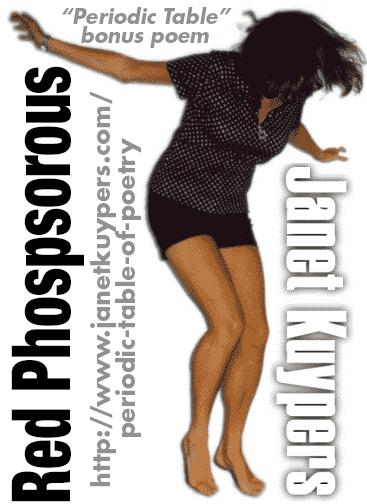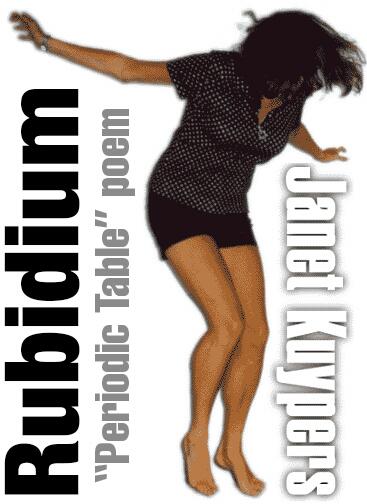Red Phosphorous
Janet Kuypers

Bonus poem from the “Periodic Table of Poetry” series, #15, P
11/4/14
Overheard a crime scene investigator,
after witnessing in a home large amounts of Red Phosphorous
say
this must have been the lab site
for making crystal meth.
So, as the reporter in me comes to life,
I instinctively turn over my mobile device
and type in
Red Phosphorous
space
meth
and hit enter,
and lo and behold,
the first site lists
a Red Phosphorous and Iodine
methamphetamine synthesis.
And I swear
I’m not looking
to make crystal meth,
but my thumb
must have pressed a link
(I hate these mobile devices)
and the site came up
for an amalgamation
of many different methods
for the simplest, fastest
and cleanest method
for producing meth-amphetamine
in the highest yields possible.
Like I want to make crystal meth.
I wonder if the government’s
going to be on my back
for following this link —
because recently,
after renting a biography audio CD
from the local library,
I saw ads appearing
on every web site I went to
for a week
suggesting I purchase
the autobiography
I just rented.
So if government agencies
are selling their data
to the highest bidder,
maybe I should also rent
while visiting on the Internet
Hitler’s Mein Kampf
along with books
on building a nuclear bomb.
That and I’ll send
a ton of emails
including the President’s name.
’Cause if corporate America
and my ever-intrusive government
are watching over me,
I may as well try
to get on their hit list.
I mean,
a girl can only hope.
#
But then I looked down
at my crystal meth web page,
and quickly closed the window,
but then I thought about it —
we need both Phosphorous
and Iodine in our bodies.
You can even find
Red Phosphorous
in every matchbook,
in flares and fireworks,
but we humans had to go mix it
with what’s in Sudafed
to make crystal meth…
And you know, I’m tired
of only being able to purchase
one package of Sudafed at a time,
and I still have to sign for it
and scan my driver’s license —
you know,
because I have sinus problems.
But if there’s anything I’ve learned
I’ve found that all the elements we need
can also be used to destroy us.
I think of all the Hydrogen in our bodies
and the H bomb, or then I think
of how our bodies need Potassium
but we use it for lethal execution injections,
there are some elements used for cancer detection
in x-rays that are products from nuclear explosions,
the list of good and bad things from elements
goes on and on, trust me…
And you may think,
“but it’s just crystal meth,”
and you may be right,
if you only do it once
it probably won’t kill you,
but it supports my point:
we ingenious humans
find a way to take everything we need,
everything that makes us… us,
and make it all something
that can also lead to our destruction.
It’s funny how we humans do that,
how we search, explore and discover
to find that the flip side
of the elemental coins
that keep us alive —
well, it’s scary to see
when we flip the coins
just how messed up
the other side can be.






